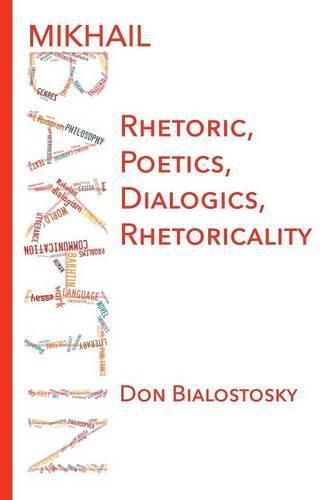Readings Newsletter
Become a Readings Member to make your shopping experience even easier.
Sign in or sign up for free!
You’re not far away from qualifying for FREE standard shipping within Australia
You’ve qualified for FREE standard shipping within Australia
The cart is loading…






This title is printed to order. This book may have been self-published. If so, we cannot guarantee the quality of the content. In the main most books will have gone through the editing process however some may not. We therefore suggest that you be aware of this before ordering this book. If in doubt check either the author or publisher’s details as we are unable to accept any returns unless they are faulty. Please contact us if you have any questions.
Foregrounding language and the utterance in the work of Mikhail Bakhtin and his colleague Valentin Voloshinov, MIKHAIL BAKHTIN: RHETORIC, POETICS, DIALOGICS, RHETORICALITY examines their insights against the background of the classical, predominantly Aristotelian, verbal liberal arts of rhetoric, dialectic, and poetics. First setting Bakhtinian dialogics against a narrow rhetoric aimed at winning over others, it goes on, drawing upon the school’s earlier phenomenological and sociological writings, to elaborate a Bakhtinian discourse theory that sees all utterances as rhetorical in an expanded sense and poetry as an imitation of rhetorical utterance. BIALOSTOSKY invents a Bakhtinian dialogic criticism that he situates against such figures as Todorov, Gadamer, Rorty, and Booth and explores the potentials of Bakhtin-School thought for a revitalized rhetorical criticism. He draws parallels between Bakhtin’s dialogism and Michael Billig’s sophistic sociology and argues the importance of language and history in Bakhtin’s earliest work against Morson and Emerson’s emphasis on ethics. He sets Aristotelian rhetoric against Bakhtin’s discourse theory and reads Aristotle’s Poetics against the grain to bring out its category of thought or dianoia as a site from which a Bakhtinian poetics of utterance can be recovered. A compilation and extension of more than thirty years’ work on the Bakhtin School, MIKHAIL BAKHTIN: RHETORIC, POETICS, DIALOGICS, RHETORICALITY demonstrates the rich implications of Bakhtin’s works for rhetorical theory, practice, and understanding. An early adopter of Bakhtin School ideas, DON BIALOSTOSKY first mobilized them to rehabilitate Wordsworth’s narrative experiments in Making Tales (Chicago 1984) and extended them to rethink his lyric poetry and the critics who wrote about them in Wordsworth, Dialogics, and the Practice of Criticism (Cambridge 1992). His forthcoming book How to Play a Poem from the University of Pittsburgh Press brings Bakhtin School poetics to a pedagogy for poetry. He has taught at the Universities of Utah and Washington, at Stony Brook and Toledo and Penn State. Currently he is Professor in the Composition, Literacy, Pedagogy, and Rhetoric track and Chair of the English Department at the University of Pittsburgh.
$9.00 standard shipping within Australia
FREE standard shipping within Australia for orders over $100.00
Express & International shipping calculated at checkout
This title is printed to order. This book may have been self-published. If so, we cannot guarantee the quality of the content. In the main most books will have gone through the editing process however some may not. We therefore suggest that you be aware of this before ordering this book. If in doubt check either the author or publisher’s details as we are unable to accept any returns unless they are faulty. Please contact us if you have any questions.
Foregrounding language and the utterance in the work of Mikhail Bakhtin and his colleague Valentin Voloshinov, MIKHAIL BAKHTIN: RHETORIC, POETICS, DIALOGICS, RHETORICALITY examines their insights against the background of the classical, predominantly Aristotelian, verbal liberal arts of rhetoric, dialectic, and poetics. First setting Bakhtinian dialogics against a narrow rhetoric aimed at winning over others, it goes on, drawing upon the school’s earlier phenomenological and sociological writings, to elaborate a Bakhtinian discourse theory that sees all utterances as rhetorical in an expanded sense and poetry as an imitation of rhetorical utterance. BIALOSTOSKY invents a Bakhtinian dialogic criticism that he situates against such figures as Todorov, Gadamer, Rorty, and Booth and explores the potentials of Bakhtin-School thought for a revitalized rhetorical criticism. He draws parallels between Bakhtin’s dialogism and Michael Billig’s sophistic sociology and argues the importance of language and history in Bakhtin’s earliest work against Morson and Emerson’s emphasis on ethics. He sets Aristotelian rhetoric against Bakhtin’s discourse theory and reads Aristotle’s Poetics against the grain to bring out its category of thought or dianoia as a site from which a Bakhtinian poetics of utterance can be recovered. A compilation and extension of more than thirty years’ work on the Bakhtin School, MIKHAIL BAKHTIN: RHETORIC, POETICS, DIALOGICS, RHETORICALITY demonstrates the rich implications of Bakhtin’s works for rhetorical theory, practice, and understanding. An early adopter of Bakhtin School ideas, DON BIALOSTOSKY first mobilized them to rehabilitate Wordsworth’s narrative experiments in Making Tales (Chicago 1984) and extended them to rethink his lyric poetry and the critics who wrote about them in Wordsworth, Dialogics, and the Practice of Criticism (Cambridge 1992). His forthcoming book How to Play a Poem from the University of Pittsburgh Press brings Bakhtin School poetics to a pedagogy for poetry. He has taught at the Universities of Utah and Washington, at Stony Brook and Toledo and Penn State. Currently he is Professor in the Composition, Literacy, Pedagogy, and Rhetoric track and Chair of the English Department at the University of Pittsburgh.